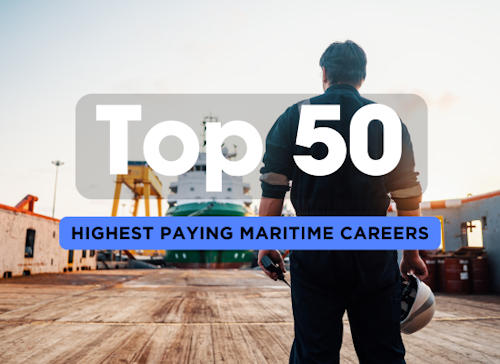Top 50 Highest Paying Careers in Maritime Shipping

The maritime shipping industry is a dynamic and vital sector that plays a critical role in global trade and economic development. With over 90% of the world’s goods transported by sea, careers in maritime shipping offer unique opportunities to work in an environment that combines cutting-edge technology, international travel, and the thrill of navigating the world's oceans. Whether you're interested in the commanding role of a Ship Captain, the technical expertise of a Marine Engineer, or the strategic responsibilities of a Fleet Manager, the maritime field provides a diverse range of high-paying careers that are as challenging as they are rewarding. This guide explores the top 50 highest-paying careers in maritime shipping, highlighting the skills, education, and opportunities that make this industry an exciting and lucrative career path.
🚢 ShipUniverse Weekly Newsletter – Free. No fluff. Just key maritime insights 📬
| ShipUniverse: Maritime Career Finder | |
|---|---|
| Salary Range | |
| Max Time Away from Home (Months) | |
| Education Level | |
| Risk Level | |
| Work Environment | |
| Recommended Careers will appear here | |
➡️ Relevant Articles:
New & Future Career Paths in Maritime Shipping: Jobs That Didn’t Exist 10 Years Ago (and What’s Coming Next)
Top 15 Employee Benefits in Maritime Shipping to Attract and Retain Top Talent
| ShipUniverse: Top 50 Highest Paying Careers in Maritime Shipping | |||||
|---|---|---|---|---|---|
| Career | Average Salary | Academic Requirements | Duties | Pros | Cons |
| Ship Captain | $120,000 - $180,000+ | Maritime Academy Degree, Licensing | Overall command of the vessel, navigation, and crew management | High responsibility, leadership role, travel opportunities | Long periods away from home, high stress |
| Chief Engineer | $108,000 - $168,000+ | Maritime Academy Degree, Engineering License | Oversee engine room operations, maintenance, and repair | High technical expertise, leadership role, high demand | Challenging work environment, long hours |
| Port Engineer | $102,000 - $144,000+ | Engineering Degree, Maritime Experience | Manage maintenance and repair of vessels in port | Good salary, job stability, technical work | High stress, often on-call |
| Marine Superintendent | $96,000 - $156,000+ | Maritime Academy Degree, Experience | Oversee ship operations, ensure regulatory compliance | Leadership role, diverse responsibilities | High pressure, regulatory challenges |
| Naval Architect | $90,000 - $144,000+ | Engineering Degree, Naval Architecture Specialization | Design and oversee construction of ships and marine structures | Creative design work, high demand | Long projects, high responsibility |
| Marine Surveyor | $84,000 - $132,000+ | Maritime Academy Degree, Certifications | Inspect ships for compliance with regulations and standards | Varied work environments, good salary | Travel required, risk of exposure to hazardous conditions |
| Maritime Lawyer | $120,000 - $192,000+ | Law Degree, Specialization in Maritime Law | Handle legal cases involving shipping, insurance, and regulations | High earning potential, intellectually challenging | Long hours, high stress |
| Harbor Master | $102,000 - $156,000+ | Maritime Academy Degree, Extensive Experience | Oversee port and harbor operations | Leadership role, vital to port operations | High responsibility, high stress |
| Marine Pilot | $108,000 - $180,000+ | Maritime Academy Degree, Pilotage License | Guide ships through congested or dangerous waters | High salary, vital role in navigation | Challenging work, high risk |
| Offshore Installation Manager (OIM) | $120,000 - $216,000+ | Engineering Degree, Offshore Experience | Manage offshore drilling operations and platforms | High earning potential, leadership role | High stress, hazardous environment |
| Marine Environmental Scientist | $72,000 - $115,000+ | Environmental Science or Marine Biology Degree | Study and mitigate environmental impacts of maritime activities | Work in diverse environments, contribute to environmental protection | Fieldwork can be physically demanding, funding dependent |
| Port Manager | $90,000 - $140,000+ | Maritime or Business Administration Degree | Manage the operations and administration of a port | Leadership role, high responsibility | High stress, complex logistics |
| Logistics Manager (Maritime) | $84,000 - $126,000+ | Logistics or Business Administration Degree | Coordinate the transportation of goods by sea | Crucial role in supply chain, good salary | High pressure, fast-paced environment |
| Fleet Manager | $90,000 - $135,000+ | Maritime or Business Administration Degree | Oversee the operation and maintenance of a fleet of vessels | Leadership role, manages large operations | High stress, large scope of responsibility |
| Safety Manager (Maritime) | $80,000 - $120,000+ | Safety Management or Maritime Degree | Ensure safety protocols on vessels and in port facilities | Ensures safety protocols, good salary | High responsibility, regulatory challenges |
| Marine Operations Consultant | $85,000 - $130,000+ | Maritime or Business Degree | Provide expert advice on maritime operations | Diverse projects, expertise valued | Project-based work, requires experience |
| Chief Steward | $70,000 - $105,000+ | Hospitality Management Degree or Maritime Experience | Manage catering and hospitality services on large ships | Oversees catering and hospitality, travel opportunities | Long hours, demanding work |
| Marine Electrician | $65,000 - $95,000+ | Electrical Engineering Degree or Certification | Specialize in electrical systems on ships and offshore platforms | High demand, specialized skill set | Physically demanding, potential hazards |
| Marine Engineer | $84,000 - $126,000+ | Engineering Degree, Maritime Experience | Design and maintain marine machinery and systems | High technical expertise, good salary | Challenging work environment, long hours |
| Offshore Drilling Supervisor | $110,000 - $165,000+ | Engineering Degree, Offshore Experience | Oversee drilling operations on offshore rigs | High earning potential, leadership role | High stress, hazardous environment |
| Maritime Insurance Underwriter | $90,000 - $135,000+ | Finance or Insurance Degree, Certifications | Assess and underwrite insurance policies for ships and cargo | Stable career, good salary | Requires strong analytical skills, high responsibility |
| Offshore Construction Manager | $105,000 - $157,000+ | Engineering Degree, Offshore Experience | Manage construction projects on offshore platforms | High earning potential, leadership role | Physically demanding, high stress |
| Shipyard Manager | $95,000 - $143,000+ | Engineering or Maritime Management Degree | Oversee the operation of a shipyard, including construction and repairs | Leadership role, stable career | High responsibility, complex operations |
| Maritime Instructor | $70,000 - $105,000+ | Maritime Degree, Teaching Certification | Teach courses related to maritime professions | Rewarding career, stable hours | Requires experience, teaching can be challenging |
| Subsea Engineer | $110,000 - $165,000+ | Engineering Degree, Subsea Specialization | Specialize in underwater engineering projects | High earning potential, specialized skill set | High risk, demanding work environment |
| Vessel Traffic Service Operator | $75,000 - $113,000+ | Maritime Degree or Certification | Monitor and manage ship traffic to prevent collisions and accidents | Critical role, good salary | High stress, requires vigilance |
| Maritime Security Specialist | $80,000 - $120,000+ | Security or Maritime Degree | Provide security for ships, ports, and offshore installations | High demand, vital role in safety | Risk of danger, high responsibility |
| Port Operations Coordinator | $75,000 - $113,000+ | Logistics or Maritime Degree | Coordinate daily operations within a port | Good salary, diverse responsibilities | Fast-paced environment, high stress |
| LNG/LPG Carrier Officer | $95,000 - $143,000+ | Maritime Academy Degree, Certifications | Work on specialized vessels that transport LNG or LPG | High salary, specialized role | Requires specific training, potential hazards |
| Oceanographer | $70,000 - $105,000+ | Oceanography or Marine Science Degree | Study the physical and biological aspects of the ocean | Interesting work, field research opportunities | Fieldwork can be physically demanding, dependent on research funding |
| Port Planner | $85,000 - $130,000+ | Civil Engineering or Urban Planning Degree | Plan and design port infrastructure and logistics | Critical role in port development, good salary | Long-term projects, requires strong planning skills |
| Marine Biologist | $65,000 - $98,000+ | Marine Biology or Environmental Science Degree | Study marine life and ecosystems | Contribute to environmental conservation, diverse research opportunities | Fieldwork can be demanding, research funding dependent |
| Diving Superintendent | $95,000 - $143,000+ | Commercial Diving Certification, Offshore Experience | Oversee underwater diving operations | Leadership role in diving operations, high salary | Physically demanding, high risk |
| Tugboat Captain | $85,000 - $130,000+ | Maritime Academy Degree, Licensing | Operate tugboats to assist larger ships in maneuvering | Vital role in port operations, good salary | High responsibility, often involves long hours |
| Hydrographic Surveyor | $75,000 - $113,000+ | Surveying or Geomatics Degree | Map underwater surfaces and study seabed topography | Interesting work, vital for marine construction | Fieldwork can be physically demanding, requires precision |
| Marine Cargo Surveyor | $70,000 - $105,000+ | Maritime Academy Degree, Certifications | Inspect and document the condition of cargo before and after transport | Varied work environments, good salary | Travel required, high responsibility |
| ROV (Remotely Operated Vehicle) Supervisor | $90,000 - $135,000+ | Engineering Degree, ROV Certification | Manage the operation of underwater ROVs used for exploration and inspection | High earning potential, specialized role | Physically demanding, requires technical expertise |
| Vessel Chartering Manager | $85,000 - $130,000+ | Business or Maritime Degree | Manage the leasing of vessels for cargo transport | Good salary, critical role in logistics | High pressure, requires strong negotiation skills |
| Commercial Diver | $75,000 - $113,000+ | Commercial Diving Certification | Perform underwater construction, inspection, and repair tasks | High demand, high earning potential | Physically demanding, high risk |
| Coastal Engineer | $85,000 - $130,000+ | Civil or Coastal Engineering Degree | Design and manage coastal structures like sea walls and piers | Critical role in coastal infrastructure, good salary | Long-term projects, requires strong technical skills |
| Marine Telecommunications Engineer | $80,000 - $120,000+ | Telecommunications or Engineering Degree | Install and maintain communication systems on ships and offshore platforms | Vital role in ship communication, good salary | Requires technical expertise, sometimes involves travel |
| Ship’s Cook | $50,000 - $75,000+ | Culinary Training, Maritime Experience | Manage the kitchen and prepare meals for the crew | Travel opportunities, essential role on board | Long hours, challenging work environment |
| Marine Cargo Planner | $65,000 - $98,000+ | Logistics or Maritime Degree | Plan and coordinate the loading and unloading of cargo on ships | Interesting logistics role, good salary | High pressure, requires attention to detail |
| Marine Insurance Adjuster | $70,000 - $105,000+ | Insurance or Maritime Degree, Certifications | Investigate and process claims related to marine insurance | Good salary, stable career | Requires strong analytical skills, travel may be required |
| Crane Operator (Offshore) | $75,000 - $113,000+ | Crane Operation Certification, Offshore Experience | Operate cranes on offshore platforms or vessels | High earning potential, vital role in operations | Physically demanding, high risk |
| Maritime HR Manager | $85,000 - $130,000+ | Human Resources or Maritime Degree | Manage human resources for maritime companies | Leadership role, good salary | Requires strong interpersonal skills, high responsibility |
| Marine Salvage Operator | $90,000 - $135,000+ | Maritime Degree, Salvage Certification | Oversee marine salvage operations | High earning potential, critical role in rescue operations | Physically demanding, high risk |
| Marine Engineer Superintendent | $100,000 - $150,000+ | Engineering Degree, Maritime Experience | Oversee engineering operations on multiple vessels | Leadership role, high salary | High responsibility, challenging work environment |
| Shipbroker | $95,000 - $145,000+ | Business or Maritime Degree | Facilitate the buying, selling, and chartering of ships | High earning potential, critical role in trade | High pressure, requires strong negotiation skills |
| Marine Pilot Trainer | $90,000 - $140,000+ | Maritime Degree, Extensive Experience | Train and mentor marine pilots | Rewarding career, leadership role | Requires extensive experience, high responsibility |
Insider Tips for Landing a High-Paying Job in Maritime Shipping
- Gain Specialized Certifications Early:
- Certifications like STCW (Standards of Training, Certification, and Watchkeeping for Seafarers), GMDSS (Global Maritime Distress and Safety System), and other specialized maritime credentials can set you apart from other candidates. These certifications are often required for advanced positions, and having them early in your career can fast-track your progress.
- Leverage Industry Networking:
- The maritime industry is close-knit, with many opportunities arising from personal connections. Attend maritime conferences, join professional organizations like the International Maritime Organization (IMO), and connect with industry professionals on LinkedIn. Networking can lead to job referrals, mentorship, and insider knowledge about upcoming opportunities.
- Target High-Demand Regions:
- Certain regions, such as the Middle East, Southeast Asia, and parts of Europe, have a higher demand for skilled maritime professionals due to their bustling ports and shipping industries. Consider relocating or targeting job searches in these high-demand areas to access better-paying positions.
- Start with a Reputable Shipping Company:
- Gaining experience with a well-known and reputable shipping company can significantly boost your resume. Companies with strong safety records, cutting-edge technology, and global reach often offer better training, career advancement opportunities, and higher salaries.
- Develop a Niche Expertise:
- Specializing in a niche area, such as LNG/LPG transportation, offshore oil and gas, or maritime cybersecurity, can make you a highly sought-after expert. Employers are willing to pay a premium for professionals with deep knowledge and experience in these specialized areas.
- Pursue Continuous Learning and Development:
- The maritime industry is constantly evolving with new technologies and regulations. Stay ahead of the curve by pursuing continuous education, attending industry workshops, and keeping up with the latest trends and advancements. Employers value candidates who are proactive about their professional development.
- Build a Strong Reputation at Sea:
- Your reputation matters greatly in the maritime industry. Demonstrating strong leadership, reliability, and a commitment to safety while working at sea can lead to faster promotions and higher-paying roles. Your work ethic and conduct on board will follow you throughout your career.
- Consider Offshore and Remote Assignments:
- While challenging, offshore and remote assignments often come with significantly higher pay due to the demanding nature of the work. Positions on offshore rigs, in Arctic waters, or other remote locations can fast-track your earnings and career progression.
- Master the Art of Negotiation:
- Don’t be afraid to negotiate your salary and benefits, especially if you bring specialized skills to the table. Research industry standards, know your worth, and be prepared to discuss how your unique expertise can benefit the company.
- Utilize Industry-Specific Job Boards:
- General job boards might not list the best opportunities in the maritime field. Use industry-specific job boards like MarineTraffic, Sea Career, or even direct company portals to find high-paying positions that match your qualifications.
- Seek Out Mentorship:
- Having a mentor who is established in the maritime industry can provide invaluable guidance and open doors to high-paying opportunities. Mentors can offer advice on career paths, introduce you to key contacts, and help you navigate the unique challenges of the industry.
- Stay Physically and Mentally Fit:
- Maritime jobs, especially those at sea, can be physically and mentally demanding. Maintaining good health and demonstrating resilience are key factors that employers look for when considering candidates for high-responsibility roles.
- Understand and Comply with Global Maritime Laws:
- A strong understanding of international maritime law, regulations, and environmental standards can make you a valuable asset to any shipping company. Compliance is critical in the industry, and professionals with this knowledge are in high demand.
- Be Open to Diverse Roles:
- Starting in a less glamorous or lower-paying role can often lead to unexpected opportunities. Be open to diverse roles within the maritime industry, as they can provide the experience and connections needed to land a higher-paying job later on.
- Leverage Language Skills:
- The maritime industry is global, and fluency in multiple languages can be a significant asset. Being able to communicate effectively with crews from different countries can make you a preferred candidate for multinational companies and international assignments.

Do you have a Maritime Product or Service that may be of interest to Shipowners? Tell us about it here!
Do you have feedback or insights? Please reach out to editor @ shipuniverse.com



